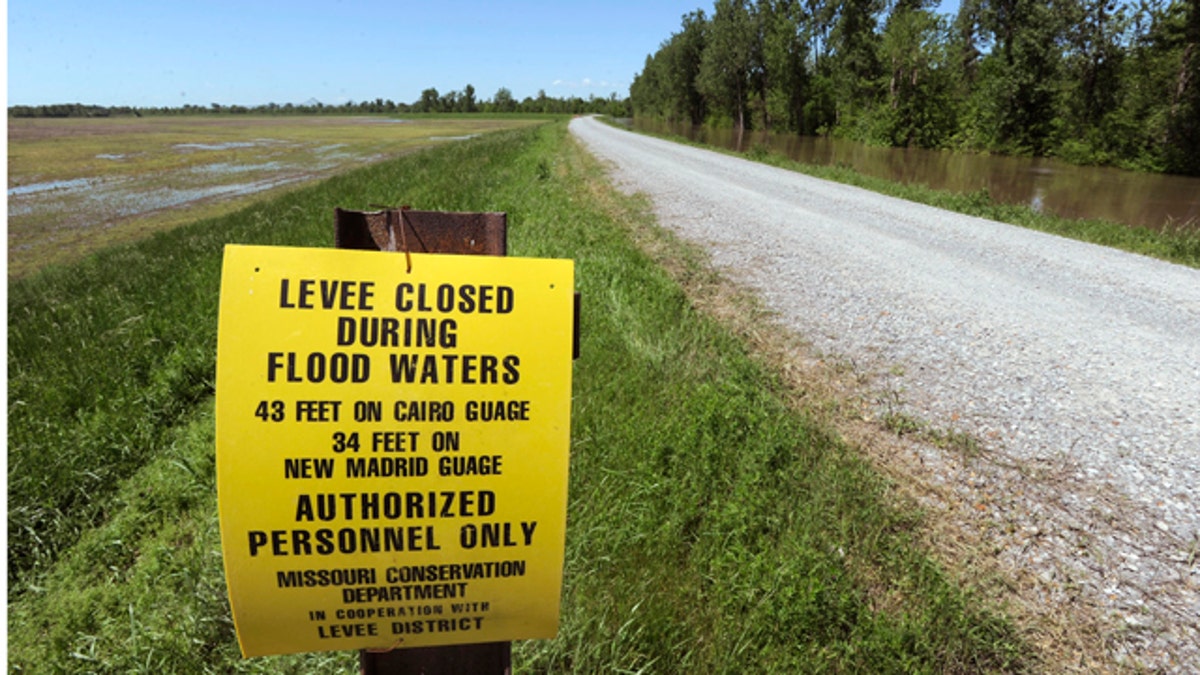
April 29: The Birds Point levee is seen with the New Madrid Floodway, at left, and the Mississippi River floodwaters, at right in Birds Point, Mo. ( )
CAIRO, Ill. -- Missouri Attorney General Chris Koster asked the U.S. Supreme Court on Sunday to block federal officials from destroying a Mississippi River levee as they try to prevent flooding in a small Illinois city.
The Army Corps of Engineers is considering blowing a two-mile hole into the Birds Point levee in southeast Missouri, which would flood 130,000 acres of farmland in Missouri's Mississippi County but protect nearby Cairo. The city of 2,800 residents is being threatened by the dangerously swollen Mississippi and Ohio rivers.
The 8th U.S. Circuit Court of Appeals rejected Koster's bid Saturday to stop the corps' plan, though corps officials are monitoring water levels and haven't decided whether to go through with the blast.
"In light of the devastation faced by the citizens of Mississippi County -- devastation that will persist in the area for years to come -- it is the responsibility of this office to pursue every possible avenue of legal review," Koster said in a statement.
Cairo's mayor issued a mandatory evacuation Saturday, then passing thunderstorms dumped rain overnight on the already waterlogged region. By Sunday morning, water levels broke a record along the Ohio River, adding to the worries of emergency officials.
Police went door to door Sunday to make sure people were leaving, though about 20 to 30 families refused to evacuate, according to the Illinois National Guard. Those residents signed waivers indicating they understood the risk.
Mayor Judson Childs ordered the evacuation because of a "sand boil," an area of river water seepage, that had become dangerously large. He made the decision after meeting with Maj. Gen. Michael Walsh, the Army Corps of Engineers officer tasked with deciding whether to breech the Birds Point levee to relieve pressure on other levees along the two rivers.
Sand boils occur when high-pressure water pushes under flood walls and levees and wells up through the soil behind them. They're a potential sign of trouble.
City clerk Lorrie Hesselrode described the boil as "kind of like Old Faithful," the famous geyser in Yellowstone National Park in Wyoming. "There's so much water pressure it forces the water under ground."
"It's kind of scary. It's pretty big. We've had sand boils before but nothing like this. It is under control but other boils have popped up," she said.
Early Sunday, the Ohio River topped a 1937 record of 59.50 feet by reaching 59.59 feet in Cairo, the National Weather Service reported.
The river is expected to crest in Cairo at 60.5 feet by Tuesday and stay there through at least Thursday afternoon, according to the National Weather Service. A flood wall protects Cairo up to 64 feet, but the corps fears that water pressure could compromise the wall and earthen levees that protect other parts of the city.
The corps moved a pair of barges loaded with the makings of an explosive sludge into position near the levee Saturday, though the agency hasn't decided that it needs to breach the 60-foot-high earthen wall.
The 230 people who live in the southeast Missouri flood plain behind the levee had already been evacuated from their homes, and as many as 800 were asked to leave surrounding areas, said Scott Holste, spokesman for Missouri Gov. Jay Nixon said.
"The entire area has been evacuated now," Holste said, adding that more than 600 Missouri National Guard troops are helping local law enforcement at checkpoints around the area.
Some of the farmers whose land would be inundated moved out what they could Saturday.
"When the water hits this dirt, it's going to make a hell of a mess," farmer Ed Marshall said as he packed up his farm office and hauled away propane tanks and other equipment.
He said he was keeping an eye on the weather forecast, which called for several more inches of rain over the next few days.
"If that happens, I don't believe they'll be able to hold it," he said.
In Cairo, which is just north of where the Ohio flows into the Mississippi, the mayor said he was relieved that the courts have sided with the corps.
"I've been saying all along that we can't take land over lives," Childs said.
Illinois, Kentucky and Tennessee want the corps to move forward with the plan. Illinois Attorney General Lisa Madigan vowed to fight Koster's appeal Sunday, calling it "yet another unfortunate and legally unjustified attempt" to prevent federal authorities from protecting Illinois residents.

